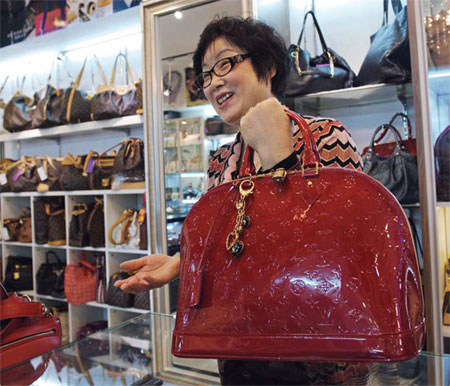Old is the new new
Updated: 2013-02-01 08:56
By Lv Chang (China Daily)
|
||||||||
|
The owner of Milan Fashion, Julie Zhu, shows a second-hand Dior bag to customers. Wei Xiaohao / China Daily |
Big-city shops are finding that pass-me-downs are not so uncool after all
Buying, let alone carrying around, a second-hand purse may be unpopular in China, but the nation's obsession with luxury goods is driving its young nouveaux riches into bargain basements looking for brand-name bags on the cheap.
In big cities such as Beijing, Guangzhou and Shanghai, service shops that mend, exchange, buy back and sell second-hand luxury goods are emerging. Outlets of second-hand luxury chains from Hong Kong and Japan are expanding and feeding on China's luxury market.
Julie Zhu, 56, is among the earliest second-hand luxury store owners in Beijing. Zhu, inspired by the Milan Station, a pre-owned luxury retailer in Hong Kong, opened her first store 10 years ago.
But Zhu, who named her store Milan Fashion and who has two shops in the capital, says it was not until recently that her business has grown. She says Chinese consumers used to shy away from second-hand bags.
"The first five years were a difficult period and we had to educate customers because they didn't get on board with our new business model," she says.
Business grew after 2008 when the recession hit. She says the global downturn "whipped" wealthy customers into loyal ones, shifting their eyes from full-price shops to retail outlets that offer discounts or second-hand luxury products.
Recently, on a trip to Zhu's 40 square meter store, customers packed the tiny shop looking for designer bags including Bottega Veneta, Prada, Louis Vuitton, Dior and Hermes. It was a clear sign that more consumers, at least in Beijing, are looking to the second-hand market for luxury goods.
Zhu says the company has grown more than 20 percent in recent years and has hundreds of bags to sell.
But second-hand designer goods do not always come cheap. A Dior bag, which seemed brand new at the store, sold for close to $4,000 (2,947 euros), about 20 percent of the retail price. Items that are limited editions or hard-to-find products sometimes sell at prices higher.
"People are changing their perception about the used luxury good," she says. "As Chinese customers who used to think that they were too rich to buy pre-owned luxuries are traveling more and are being exposed to overseas trends, they become more accepting of second-hand stores."
Lucy Liu, 32, who shops frequently at Milan Fashion, says she likes the concept of buying used luxury goods.
"One woman's trash is another woman's treasure," says Liu, who checked out a beige Chanel bag and hung it on her shoulder. "Women get bored easily with the new discretionary items that they bought, but it is a waste if they throw them away and buy new ones."
Tony Chan, Milan Station's chief promotion officer, says many of his most recent handbags are trendy and are from women who got bored with their new toys.
"This is how we receive the most innovative programs," he says, adding that many women get bored even before the bag is displayed on the shelf.
Cecilia Zhang, an English translator who regularly shops at Milan Station, says she does not care whether a bag is used. She mostly cares about its condition and how the current price compares to its original retail price.
"Second-hand goods don't necessarily equal lower quality and someone's cast-off," she says. "We all grew up wearing our big sister's or brother's worn clothes, so if you think that way, the whole concept of buying second-hand goods is kind of green."
At the shop, a second-hand Bottega Veneta bag sells for more than $3,000, compared with its $6,000 original sticker price.
Zhu says the second-hand luxury goods market has recently been hit hard because more people are turning to the Internet to shop for luxury items.
"The thing about online shopping is that you can't tell whether it is fake or real," Zhu says. "Sometimes shoppers are attracted by the low price online, but it might be a fake with cheap leather or it is missing details. You wouldn't know if you don't see it."
Zhu plans to expand one of her stores into a place where consumers can find a second-hand purse at only $100, far cheaper than it would be online.
"I've been in the luxury goods market for more than 10 years and I have accumulated much in my inventory during this period," she says. "The place will be somewhere I can clear my stock and at the same time enable genuine luxury to be within reach of the average Jane."
lvchang@chinadaily.com.cn
(China Daily 02/01/2013 page11)

 Li Na on Time cover, makes influential 100 list
Li Na on Time cover, makes influential 100 list
 FBI releases photos of 2 Boston bombings suspects
FBI releases photos of 2 Boston bombings suspects
 World's wackiest hairstyles
World's wackiest hairstyles
 Sandstorms strike Northwest China
Sandstorms strike Northwest China
 Never-seen photos of Madonna on display
Never-seen photos of Madonna on display
 H7N9 outbreak linked to waterfowl migration
H7N9 outbreak linked to waterfowl migration
 Dozens feared dead in Texas plant blast
Dozens feared dead in Texas plant blast
 Venezuelan court rules out manual votes counting
Venezuelan court rules out manual votes counting
Most Viewed
Editor's Picks

|

|

|

|

|

|
Today's Top News
Boston bombing suspect reported cornered on boat
7.0-magnitude quake hits Sichuan
Cross-talk artist helps to spread the word
'Green' awareness levels drop in Beijing
Palace Museum spruces up
First couple on Time's list of most influential
H7N9 flu transmission studied
Trading channels 'need to broaden'
US Weekly

|

|









